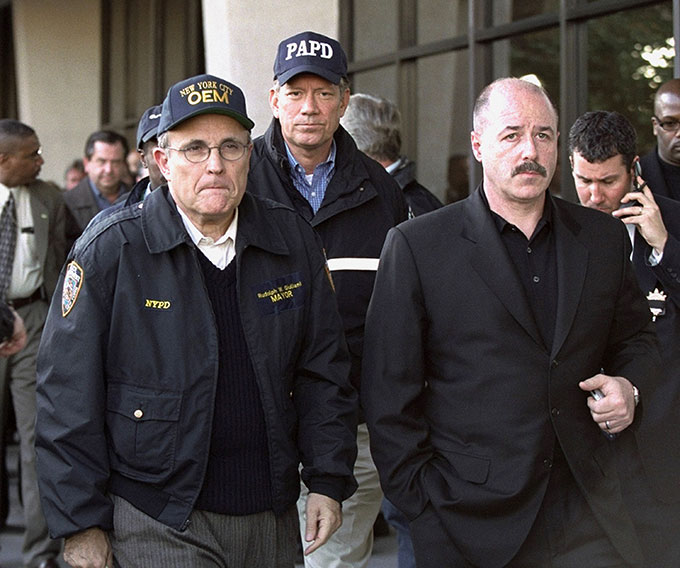Bernard Kerik, who died last week at 69, in some ways embodied the American archetype of the self-made man. He rose from high school dropout to New York City police commissioner during the crucible of 9/11, only to fall from grace amid scandal and imprisonment, before picking himself back up and starting again.
Born in Newark, New Jersey, in 1955, Kerik endured early years marked by instability. As if out of a James Ellroy novel, his mother, a prostitute, abandoned him when he was a child and later died from a blow to the head, likely a homicide, leaving a psychological void that Kerik would later describe as formative. He dropped out of Paterson’s Eastside High School but found structure in the U.S. Army, serving as a military cop in South Korea and training special forces at the John F. Kennedy Unconventional Warfare Center in North Carolina. After working in private security, including for the Saudi royal family, he joined the NYPD in 1986.
Finally, a reason to check your email.
Sign up for our free newsletter today.
His ascent was rapid, aided by an alliance with Rudy Giuliani, whom he served as bodyguard during the 1993 mayoral campaign. Giuliani, who has always prized loyalty, saw in Kerik a kindred spirit—aggressive, tireless, unpretentious. “We’ve been together since the beginning,” Giuliani said on his podcast after Kerik’s death. “He’s like my brother. I was a better man for having known Bernie. I certainly was a braver and stronger man.”
In 1998, Giuliani named Kerik commissioner of New York City’s Department of Correction, then mired in violence, racial tension, and gang activity—especially at Rikers Island. Kerik’s performance was impressive. He cracked down on entrenched “security posts” controlled by inmate gangs and supported line officers in reasserting control. He emphasized direct accountability, top-down discipline, and unflinching managerial will. The approach earned him enemies among progressives and correctional-union leaders but inspired many of his officers. “‘Shit happens,’” Kerik recalled of their attitude when he arrived. “I said: ‘You make $120,000 for what? What do you do?’” After a few years in charge, though, he could confidently say: “Today, I’d put my managers up against any managers in New York City, and I’ll bet you my people know more about their jobs.”

The results were undeniable. As Frank Straub and Paul E. O’Connell detailed in a 1999 City Journal essay, inmate-on-inmate violence dropped, staff absenteeism declined, and the system held firm during years when other cities saw their jails descend further into chaos. Kerik attributed this success not to funding or reformist policy, but to a restoration of moral clarity: officers were there to maintain order, and inmates to follow it.
I met Kerik a few times at Manhattan Institute events during those years and interviewed him as well. He had the confident air of a man who had faced real danger—he’d been a ponytailed, goateed, diamond-earring-wearing, undercover narcotics cop, in addition to his later security work in the Middle East—and the coiled bearing of a martial arts expert (he held a black belt in karate). But I also sensed that he walked a little too close to the fire—that he had an undue appetite for risk.
In 2000, Giuliani named him the city’s 40th police commissioner. Kerik’s tenure was brief but unforgettable. He stood beside Giuliani in the smoldering rubble of Ground Zero, helped coordinate the city’s emergency response, and—like the mayor—became, for a time, a national symbol of American resilience.
In 2003, the Bush administration dispatched Kerik to Iraq to help rebuild the country’s shattered police force. Though his tour was short, it raised his national profile and paved the way for his nomination as Secretary of Homeland Security in 2004. The nomination collapsed within days, amid revelations that he had employed an illegal immigrant nanny. That embarrassment soon widened into scandal: an abandoned Korean daughter, unreported loans, tax evasion, misused city contractors, and ties to mob-linked firms all came to light. In 2009, Kerik pleaded guilty to eight felony counts and served three years in federal prison.
His later years were marked by reinvention. In his 2015 memoir, From Jailer to Jailed, he reflected on his career and his time behind bars with candor. While some critics saw the book as self-exculpating, it revealed someone capable of reflection. Donald Trump pardoned him in 2020, after which Kerik became a vocal supporter of efforts to challenge the results of the 2020 election. During the January 6 investigations, his name resurfaced—this time as a behind-the-scenes operator for Giuliani’s legal team. Loyalty had become the throughline in a career full of second acts. FBI director Kash Patel’s praise of Kerik on his passing as “a warrior, a patriot, and one of the most courageous public servants this country has ever known” suggested that his public rehabilitation was complete.
Writing in City Journal in 2001, Kerik offered a populist defense of rank-and-file police officers, arguing that accusations of racism often masked discomfort with the blunt realities of street-level law enforcement. That short piece—“It’s Rudeness, Not Racism”—reads as strikingly relevant today, following years of anti-police agitation, the rise of the Black Lives Matter movement, and a wave of decarceral policies that have left many cities more dangerous and disorderly. As City Journal has long maintained, public safety depends not on abstractions but on moral clarity and enforcement. Kerik died at a moment when the nation, weary of permissive governance, has once again begun to demand order.
Bernard Kerik’s life, marked by triumph and disgrace, remains a cautionary tale about human nature—but also a reminder that, in America, leadership often emerges from unlikely places.
Top Photo by Mireya Acierto/Getty Images
Source link

















